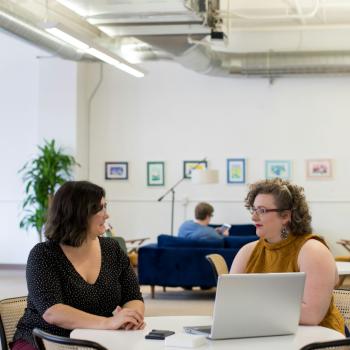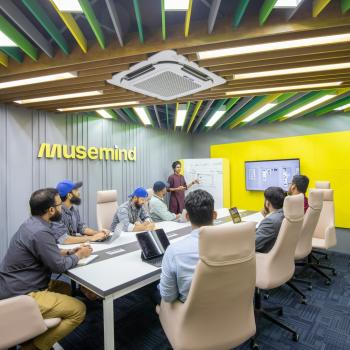
Many employees are asking “do we really need to go to the office,” in the face of the leadership at major companies like Amazon, Apple, Disney, Starbucks, and JP Morgan mandating three or more days a week of office-based work. Employees are adamant that they are doing their jobs effectively at home, and data supports the improved productivity of remote work. But many leaders feel concerned about a range of issues, from problematic communication and coordination to cybersecurity, which they feel remote work undermines.
However, with the advent of generative AI like ChatGPT, we are on the cusp of realizing the full potential of remote and hybrid work by reducing – while not eliminating – the benefits of office visits. AI is not just a futuristic buzzword; it’s a transformative force that’s reshaping the workplace and redefining the meaning of work itself.
I talk to five-ten leaders each week about hybrid and remote work, and in recent months, our conversations have centered on how generative AI can help us unlock the full power of remote and hybrid workforces. That includes enabling more effective information sharing, enhancing communication and collaboration, improving productivity and efficiency, supporting knowledge management and skill development, and ensuring security and privacy.
Communication and Coordination
No more watercooler gossip, but who needs it when AI-powered tools can help us share information and coordinate more effectively than ever? AI-driven applications reduce the need for physical office spaces, making remote work a breeze by facilitating instant access to relevant data and documents, streamlining communication channels for optimal collaboration, and providing intelligent recommendations for meetings, resources, and priorities. Imagine your office as a well-orchestrated symphony, with AI as the virtuoso conductor.
By integrating AI into information sharing systems, remote workers can quickly locate the necessary resources to complete their tasks, reducing the time spent searching for documents or waiting for colleagues to respond to queries. This efficient distribution of knowledge empowers employees to work independently while still maintaining a sense of connection to their colleagues and the organization as a whole.
Loneliness and isolation can be remote work’s kryptonite, but AI comes to the rescue with innovative solutions that empower communication and collaboration. By harnessing the power of AI, remote workers can leverage smart tools to enhance video conferencing, document sharing, and project management. AI can help remote workers video conference like pros by adjusting factors like lighting, the background image, and even the “smoothness” of participants’ faces. This helps remote workers look their best on camera and ensures that they can put forward a consistent, professional appearance. AI also makes live video conferences more efficient by providing features like real-time transcription, translation, and captioning.
Productivity and Teamwork
Furthermore, AI-driven platforms can match skillsets and interests for optimal team formation, creating virtual teams that work harmoniously to achieve common goals. Remote workers can engage in peer-to-peer learning and mentoring through AI-curated content and resources, fostering a sense of camaraderie and encouraging the exchange of valuable knowledge and experience. Say goodbye to the lonely freelancer and hello to a thriving, interconnected remote workforce.
AI is a productivity powerhouse that can free remote workers from the shackles of repetitive tasks, allowing them to focus on higher-value activities. With AI’s help, remote workers can automate mundane tasks and streamline workflows for maximum efficiency. By analyzing patterns in employee behavior and performance, AI can identify areas for improvement and provide tailored recommendations for optimization. This enables remote workers to manage their time effectively and prioritize tasks in a way that maximizes productivity and minimizes burnout.
In a remote work environment, knowledge is power, and AI is the key to unlocking it. AI empowers remote workers to access and share knowledge by identifying experts and curating relevant content tailored to individual needs. By utilizing natural language processing and machine learning, AI can understand queries and provide personalized answers, enabling remote workers to access timely and relevant information. AI can also curate and organize information from various sources and present it in a user-friendly way, streamlining the process of locating and absorbing knowledge.
AI supports skill development by personalizing learning paths and offering customized resources for remote workers. By analyzing individual strengths, weaknesses, and interests, AI can recommend targeted training programs and learning materials that enable remote employees to continually expand their skillsets and stay competitive in the job market. AI also facilitates the exchange of best practices, feedback, and advice among peers, creating a supportive and growth-oriented remote work environment.
Cybersecurity and Privacy
Remote work often raises concerns about data security and privacy, but AI has our backs. AI-powered tools can help ensure the security and privacy of remote workers by detecting and preventing cyberattacks with advanced threat intelligence. By continuously monitoring networks and devices for any signs of unauthorized access or malicious activity, AI can quickly identify potential vulnerabilities and neutralize threats before they escalate.
Additionally, AI can encrypt data and enforce policies to safeguard sensitive information, ensuring that remote workers can confidently access and share company resources without compromising security. This is especially important in industries that handle sensitive data, such as finance and healthcare, where a security breach could have severe consequences.
Health and Wellbeing
AI can also improve the well-being and quality of life of remote workers by monitoring health indicators, providing feedback and reminders, and predicting mental health issues. By analyzing data from wearables and other health monitoring devices, AI can provide personalized recommendations for maintaining physical and mental well-being. This might include suggestions for exercise, diet, and sleep, as well as reminders to take breaks and practice stress-reducing techniques.
By identifying patterns of behavior that may indicate burnout or other mental health concerns, AI can alert remote workers and their managers to potential issues before they become serious problems. This proactive approach to mental health can help create a healthier and more supportive remote work environment, fostering long-term employee satisfaction and retention.
Managing AI Risks
While the benefits of generative AI for remote and hybrid work are immense, it’s important to recognize and address the potential risks associated with the widespread adoption of AI technology. By proactively managing these risks, organizations can confidently harness the power of AI to revolutionize the way we work.
One potential risk is the legal liability associated with AI-driven decisions and actions. As AI systems become increasingly sophisticated and autonomous, questions arise about who is legally responsible when an AI system makes an error or causes harm. Organizations must take steps to ensure that clear guidelines and regulations are in place to determine the extent of their liability in such cases, as well as establish robust governance frameworks for AI decision-making.
Another challenge to consider is the potential for bias in AI algorithms. Since AI systems are trained on vast amounts of data, they may inadvertently learn and perpetuate existing biases present in the data. This could lead to unfair treatment of certain individuals or groups, resulting in legal and ethical concerns. To mitigate this risk, organizations must prioritize transparency, fairness, and accountability in their AI systems by conducting regular audits, using diverse training datasets, and ensuring that stakeholders are involved in the development and deployment of AI technology.
Privacy and data protection are also critical concerns when using AI in remote and hybrid work environments. Organizations must ensure that they are compliant with data protection regulations, such as the General Data Protection Regulation (GDPR), and implement robust privacy policies to safeguard personal information. This includes obtaining explicit consent from remote workers to collect and process their data, as well as implementing strong encryption and access controls to protect sensitive information from unauthorized access or misuse.
Moreover, the reliance on AI technology in remote work may raise concerns about job displacement and the future of work. While AI can automate repetitive tasks and improve productivity, there’s a risk that some jobs may become obsolete, leading to workforce displacement and social disruption. To address this challenge, organizations must invest in reskilling and upskilling their workforce, ensuring that employees can adapt to the changing job landscape and remain competitive in the age of AI.A final series of risks are more existential, associated with uncontrolled AI. Top AI experts and funders, ranging from Elon Musk to Steve Wozniak, signed a letter asking for a 6-month pause on training AI systems. Other experts even propose a full shut-down on further AI research. Giving control of more and more systems to AI that doesn’t have human-aligned motivations indeed seems risky, and we need to make sure that our increasingly powerful AI models serve the interests of humanity.
Conclusion
The benefits of generative AI for remote and hybrid work are immense. By enabling more effective information sharing, enhancing communication and collaboration, improving productivity and efficiency, supporting knowledge management and skill development, and ensuring security and privacy, AI is revolutionizing the way we work and making it less important than ever to go to the office.
Still, it’s crucial for organizations to proactively manage the associated risks and ensure legal liability is properly addressed. By doing so, they can confidently embrace AI technology to unlock the full potential of remote and hybrid workforces and pave the way for a more flexible, efficient, and fulfilling work experience.
The future of work is here, and AI is the driving force behind this transformation. As we continue to embrace AI technology, we can unlock the full potential of remote and hybrid workforces and pave the way for a more flexible, efficient, and fulfilling work experience. It’s time to embrace the AI revolution and harness its power to redefine the very concept of work, creating opportunities for growth and innovation that extend far beyond the confines of the traditional office space.
Key Take-Away
Generative AI is revolutionizing remote and hybrid work, enhancing communication, boosting productivity, and ensuring security. While reaping the benefits, organizations must proactively manage legal, ethical, and existential risks to confidently embrace the AI-driven transformation of the work landscape… >Click to tweet
Image credit: fauxels/Pexels
Originally published in Disaster Avoidance Experts
Dr. Gleb Tsipursky was named “Office Whisperer” by The New York Times for helping leaders overcome frustrations with hybrid work and Generative AI. He serves as the CEO of the future-of-work consultancy Disaster Avoidance Experts. Dr. Gleb wrote seven best-selling books, and his two most recent ones are Returning to the Office and Leading Hybrid and Remote Teams and ChatGPT for Thought Leaders and Content Creators: Unlocking the Potential of Generative AI for Innovative and Effective Content Creation. His cutting-edge thought leadership was featured in over 650 articles and 550 interviews in Harvard Business Review, Inc. Magazine, USA Today, CBS News, Fox News, Time, Business Insider, Fortune, The New York Times, and elsewhere. His writing was translated into Chinese, Spanish, Russian, Polish, Korean, French, Vietnamese, German, and other languages. His expertise comes from over 20 years of consulting, coaching, and speaking and training for Fortune 500 companies from Aflac to Xerox. It also comes from over 15 years in academia as a behavioral scientist, with 8 years as a lecturer at UNC-Chapel Hill and 7 years as a professor at Ohio State. A proud Ukrainian American, Dr. Gleb lives in Columbus, Ohio.














